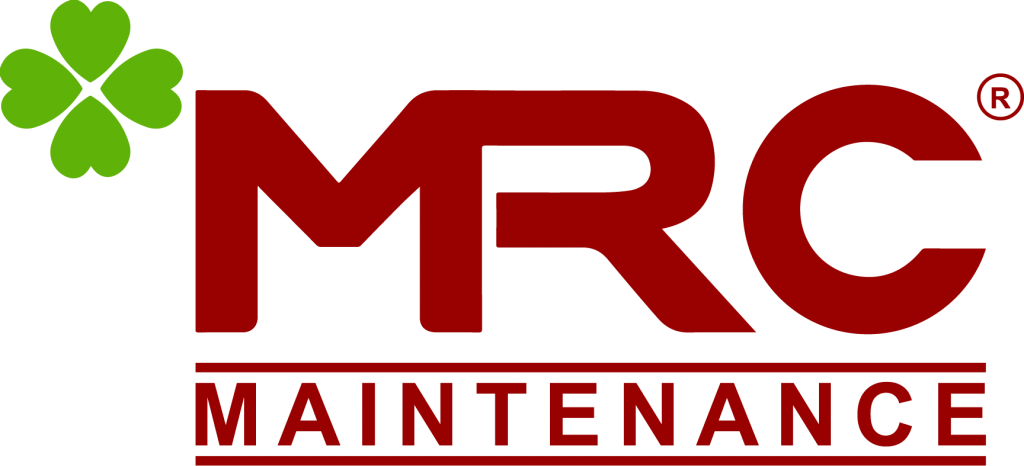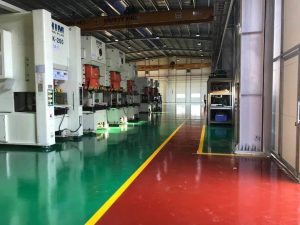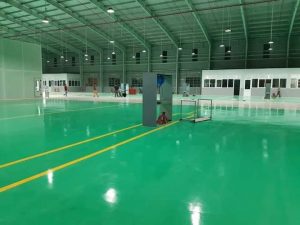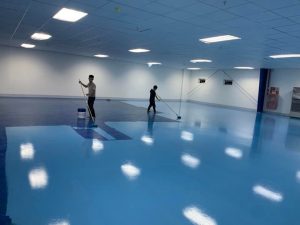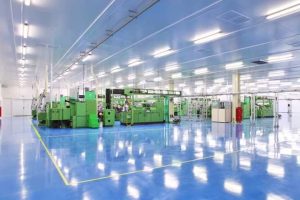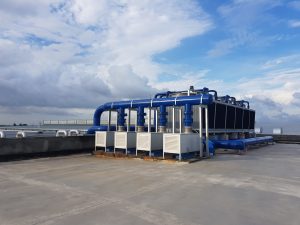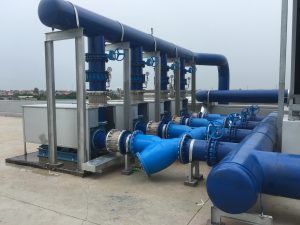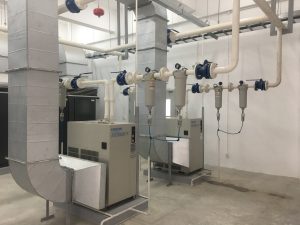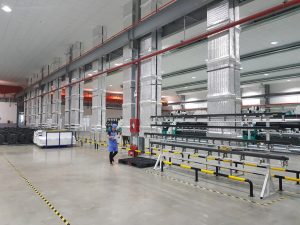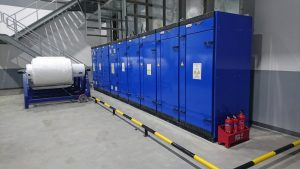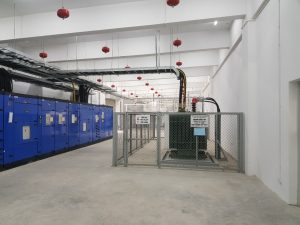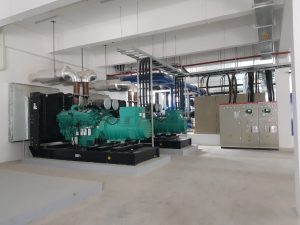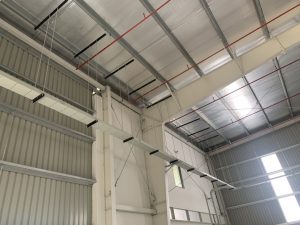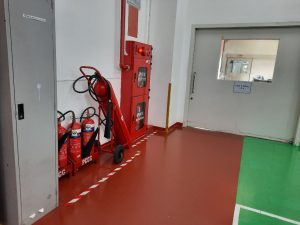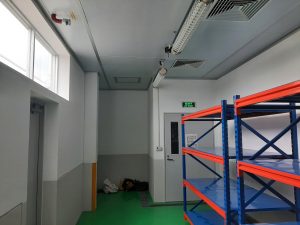MrC Vietnam Industry Co., Ltd. is a leading company in the field of providing “factory maintenance” services in Vietnam.
With more than 10 years of experience in performing Factory maintenance, we understand the important role that Factory maintenance plays in the production activities of any Factory.
So, when you use our “Factory Maintenance” Services in Vietnam, we will offer you the best solutions in terms of quality and cost.
Benefits brought by maintenance services:
- Maintenance facilitates normal and safe operations of any factory, helping manufacturers feel confident to focus on their main duties which are to improve productivity and increase profits.
- A factory is not only an asset but also a means of production of an enterprise. If you pay proper attention to ensure good maintenance, you will receive many benefits such as: a longer lifespan of the building, lower repair costs, and reduced energy consumption.
What is factory maintenance?
Plant maintenance is the process of maintaining, inspecting, repairing and improving equipment, machinery, infrastructure and other systems in a factory or manufacturing facility to ensure efficient operations, safety and continuity of the plant. This includes planning, implementing routine maintenance measures, monitoring and evaluating performance, and responding quickly to fix problems and improve production processes.
What maintenance tasks does factory maintenance in Vietnam include?
- Production machine maintenance in factory maintenance: Includes checking, maintaining and repairing production machines to ensure they operate stably and efficiently.
- Production line maintenance in factory maintenance: Includes checking and maintaining equipment, machinery and conveyors in the production line to ensure the production process runs smoothly.
- Maintenance of auxiliary systems (utilities) in factory maintenance: Includes maintenance and repair of support systems such as air compressor systems, Chiller systems, AHU air conditioning systems, ventilation system, water pump, electrical system, generator, transformer, piping system and fire protection system.
- Air compressor maintenance in factory maintenance: Check and maintain air compressors to ensure stable supply of compressed air to other equipment and systems.
- Maintaining the Chiller system in factory maintenance: Maintain and check the Chiller system to ensure stable and efficient operating temperature.
- Maintenance of AHU air conditioning system in factory maintenance: Check and maintain AHU air conditioning system to ensure clean and comfortable air supply for the working environment.
- Ventilation system maintenance in factory maintenance: Check and maintain the ventilation system to ensure good air circulation in the factory.
- Water pump maintenance in factory maintenance: Check and maintain water pumps to ensure clean and stable water supply for production processes.
- Electrical system maintenance in factory maintenance: Check and maintain electrical systems to ensure safety and stability for other equipment and systems.
- Generator maintenance in factory maintenance: Check and maintain generators to ensure backup power supply in case of need.
- Transformer maintenance in factory maintenance: Check and maintain transformers to ensure stable power supply to the entire factory.
- Pipeline system maintenance in factory maintenance: Check and maintain pipeline systems to ensure stable operation of liquid and gas systems.
- Maintaining the fire protection system in factory maintenance: Check and maintain the fire protection system to ensure readiness and effectiveness in case of a fire incident.
Comprehensive Plant maintenance strategy for different areas within the Plant.
In industrial production, Factory maintenance not only helps maintain efficient operations but also plays an important role in improving performance and saving costs. Below is a comprehensive maintenance strategy for different areas within the factory, including warehouses, production areas, assembly areas and utility areas.
- Warehouse maintenance in factory maintenance:
- Inspect and Maintain Storage Equipment: Inspect and maintain storage equipment such as pallets, forklifts, and racking systems to ensure safety and easy access to goods.
- Check and Maintain the Sensor System: Ensure that the temperature and humidity sensor system operates correctly to protect goods from damage.
- Production area maintenance in factory maintenance:
- Machinery inspection and maintenance: Carry out periodic inspection and maintenance of production machinery to ensure stable and efficient operation.
- Industrial safety inspection: Ensure that safety devices such as safety gates and collision sensors are operating properly.
- Assembly area maintenance in factory maintenance:
- Inspection and maintenance of assembly lines: Carry out inspection and maintenance of assembly lines to ensure the production process runs smoothly and without interruption.
- Check and maintain assembly tools: Maintain tools such as screwdrivers and screwdrivers to ensure performance and safety.
- Maintenance of auxiliary areas (Utilities) in factory maintenance:
- Check and maintain electrical and water systems: Check and maintain electrical and water systems to ensure continuous and safe operation.
- Infrastructure maintenance: Periodically maintain infrastructure such as roads and drainage systems to ensure a safe and comfortable working environment.
Performing comprehensive maintenance to different areas of the factory not only helps maintain operations but also enhances the performance and durability of the production infrastructure. At the same time, ensuring employee safety and protecting business assets.
Significance of maintenance work in factory maintenance.
- Ensuring continuous operations: Factory maintenance helps ensure equipment and systems operate stably, thereby minimizing production interruptions and increasing working efficiency.
- Labor safety: Implementing periodic maintenance measures and safety checks helps protect the health and lives of employees working in the factory.
- Save costs: Periodic maintenance helps detect and fix problems early, avoiding major problems and recovery costs later.
- Improved performance: Smart maintenance management can predict and prevent potential problems, improving plant performance.
- Regulatory compliance: Factory maintenance ensures compliance with legal regulations and safety, environmental, and product quality standards.
- Continuous improvement: Maintenance is not just maintenance but also an opportunity to optimize production processes, enhance technology and improve overall plant performance.
Maintenance plan and schedule in factory maintenance.
Maintenance plans and schedules in factory maintenance are often determined based on the following factors:
- Routine maintenance intervals: Routine maintenance activities are planned in advance based on the equipment’s technical life, manufacturer’s instructions, and performance experience.
- Incident and emergency prioritization: Time allocated for repair and troubleshooting is unpredictable and depends on the level of impact on production and safety.
- Upgrade and improvement plans: This includes planning projects to upgrade, improve or replace equipment and systems to improve performance and efficiency.
- Feedback from monitoring systems and performance-based maintenance: Use device performance and status data from monitoring systems to plan maintenance based on the actual status of the devices device.
- Time for special projects: Large projects such as expansion, technology improvement, or entire system replacement also require separate time plans.
Maintenance schedules are typically managed using project management tools and supporting maintenance systems, and can be flexibly adjusted to plant-specific needs.
Roles and responsibilities of maintenance manager in plant maintenance.
The roles and duties of the maintenance manager in plant maintenance are important to ensure efficient and continuous operation of the plant. Here are some of their specific responsibilities:
- Maintenance planning and management: Maintenance managers must plan routine and emergency maintenance activities, including identifying required resources and scheduling work.
- Staff and resource management: They need to manage and assign work to maintenance staff, ensuring that the team has enough manpower and skills to perform the tasks.
- Ensure safety and regulatory compliance: The maintenance manager must ensure that all maintenance activities are carried out in accordance with safety standards and comply with legal and environmental regulations.
- Data management and monitoring systems: They need to manage monitoring systems to monitor the performance and status of devices, as well as maintenance data to detect problems and trends early efficiency.
- Develop strategy and improvements: Maintenance managers need to develop a long-term strategy for plant maintenance, including recommending and implementing technology and process improvements to optimize efficiency. performance and increase equipment reliability.
- Budget and financial management: They must manage the maintenance budget, ensuring that resources are allocated effectively and can meet the plant’s maintenance needs.
In summary, the role of the maintenance manager is important to ensure the continuity and efficiency of production operations in the factory.
Consequences of improper maintenance at the right time in factory maintenance
Improper or untimely maintenance in plant maintenance can cause the following serious consequences:
- Breakdowns and production disruptions: Equipment and systems that are not properly maintained can malfunction or fail, leading to disruptions in the production process and reduced plant performance.
- Risk of occupational accidents: Improper maintenance can create an unsafe working environment, increasing the risk of occupational accidents for employees working in the factory.
- Higher repair costs: If problems are not detected and fixed promptly, they can develop into larger problems, requiring greater repair costs and downtime.
- Reduced performance and profits: Production breakdowns and disruptions can also lead to reduced overall plant performance and reduced profits.
- Damage to company image and reputation: Maintenance-related incidents and problems not only affect business performance but can also cause damage to a company’s image and reputation before customers, partners and the community.
- Loss of control and safety: If routine maintenance is not performed, equipment can become unstable and difficult to control, leading to unsafe conditions for the plant and its employees.
Notes, when performing maintenance work in factory maintenance
When performing maintenance work in plant maintenance, there are some important notes to consider:
- Safety first: Always ensure that all maintenance activities are performed safely. This includes complying with work safety regulations, using full protective equipment and checking that equipment is working properly before use.
- Plan carefully: Before starting any maintenance work, make a detailed plan of the work to be done. Including identifying required resources, estimated time, and specific steps to complete the job.
- Track and monitor: Track and monitor the performance of devices and systems to detect early signs of problems or failures. Use automated monitoring systems where available to collect data and provide early warning of problems.
- Periodic maintenance: Carry out periodic maintenance activities according to the established schedule. This helps maintain stable device performance and reduces the risk of sudden failures.
- Staff training and development: Ensure that maintenance staff are fully trained in techniques, safety and work procedures. At the same time, support them in developing skills and knowledge to work more effectively.
- Record and evaluate: Record all maintenance activities and related data to analyze and evaluate the performance of the maintenance process. Use this information to improve processes and prevent future problems.
How to estimate maintenance costs in factory maintenance.
To estimate maintenance costs in factory maintenance, you can follow these steps:
- Determine the scope of maintenance work in factory maintenance: First, determine the maintenance activities that need to be performed, including routine maintenance and emergency maintenance. Make sure that all types of necessary maintenance have been accounted for.
- Identify resources needed for plant maintenance work: List all resources needed to perform maintenance activities, including labor, materials, equipment, and external services.
- Estimate maintenance costs for factory maintenance work: Estimate costs for each resource type based on market prices and previous cost history (if any). Make sure you calculate both direct and indirect costs.
- Add provisions and project costs for factory maintenance work: Add provisions and project costs to deal with unexpected situations and risks that may arise during implementation currently under maintenance.
- Plan time and budget for plant maintenance work: Determine the expected time to complete each maintenance activity and allocate budget for each activity based on cost and scope estimates job.
- Check and confirm for plant maintenance work: Check and confirm that the cost estimate includes all necessary elements and is financially feasible.
- Monitor and adjust for plant maintenance work: Monitor actual costs against estimates and adjust as necessary to ensure that the maintenance project is performed within budget.
Significance of applying 4.0 technology to maintenance management in factory maintenance
Applying 4.0 technology to maintenance management in factory maintenance brings many important benefits and meanings, including:
- Enhanced monitoring and prediction: IoT (Internet of Things) technology allows devices to be connected to the network, thereby collecting data about their performance and status. This improves problem monitoring and prediction, helping to prevent problems before they happen.
- Manage reserves and resources more effectively: Technology 4.0 allows the use of smart management systems to track reserves and resources, helping to optimize the ordering process and inventory management Warehouse needed for maintenance.
- Enhance data-driven and planned maintenance: Data analytics and artificial intelligence (AI) can help predict potential problems and provide data-driven planned maintenance measures historical and real-time.
- Improve performance and reduce costs: 4.0 technology helps optimize maintenance processes, from planning to execution, thereby enhancing performance and reducing operating costs.
- Enhance data integrity and information security: Blockchain technology can be applied to enhance data integrity and ensure information security in maintenance management.
- Increased automation capabilities: Automation technology can be applied to automate simple and repeatable maintenance activities, helping to reduce employee workload and increase productivity job.
In summary, applying 4.0 technology to maintenance management in factory maintenance brings many benefits in terms of performance, cost and safety, while also helping to improve the ability to predict and react quickly to problems. maintenance issues.
Safety measures in factory maintenance in Vietnam
Safety solutions in factory maintenance in Vietnam are important to ensure employee safety and improve work performance. Here are some popular safety solutions:
- Training and education: Provide adequate training on occupational safety and safe work procedures for all employees involved in plant maintenance. Make sure they understand and follow safety rules.
- Use of personal protective equipment (PPE): Ensure that all employees are fully equipped with PPE appropriate to their work, including helmets, goggles, gloves, and protective shoes.
- Inspection and maintenance of equipment and machinery: Perform periodic inspection and maintenance of equipment and machinery to ensure their safe and efficient operation. Replace damaged or degraded parts according to the correct time and procedure.
- Identify and evaluate risks: Identify and evaluate potential risks during maintenance and establish preventive measures to minimize the risk of accidents.
- Implement safe work procedures: Develop and implement safe work procedures specific to each type of maintenance work, including the use of equipment and tools.
- Supervision and inspection: Carry out periodic supervision and inspection to ensure that all maintenance activities are being carried out in accordance with proper procedures and safety standards.
- Promote safety consciousness: Create a work environment that promotes safety consciousness and encourages employees to report safety hazards and issues immediately.
- Use safety technology: Apply safety technology such as automatic monitoring systems and support robots to minimize risks to employees during maintenance.
MRC Industry Company is a reliable partner in the field of factory maintenance in Vietnam, with many outstanding advantages:
- Long-term experience: With many years of experience in the plant maintenance service industry, MRC Industry has accumulated the necessary knowledge and skills to meet all customer maintenance requirements.
- Diverse customers: MRC Industry has built a diverse network of customers from the US, Europe, Korea, Japan, Taiwan and China…, proving the reputation and quality of its services. .
- Professional service: With a team of professionally trained staff and knowledgeable about maintenance processes, MRC Industry is committed to providing quality service and meeting all customer requirements.
- Highly skilled staff: MRC Industry is proud to have a team of highly skilled staff, capable of handling all complex situations and ensuring factory performance.
- Optimal solutions: MRC Industry constantly researches and develops optimal solutions, helping customers save costs and increase performance during factory maintenance.
- Quick implementation time: With flexibility and professionalism, MRC Industry is committed to implementing maintenance projects quickly, ensuring no disruption to customers’ production processes.
In short, MRC Industry not only has a lot of experience and diverse customers, but also provides professional services, has a team of highly skilled staff, provides many optimal solutions and does the job quickly. quickly.
Our factory maintenance services:
MrC Vietnam Industry Co., Ltd. provides factory maintenance services including package services or separate service items. Depending on the specific requirements of each customer, we offer the following packages:
- Comprehensive Factory Maintenance
- Maintenance of construction work items (Architecture, structure, interior)
- Electrical system maintenance
- Chiller system maintenance
- Compressed air system maintenance
- MVAC system maintenance
- Generator maintenance
- Substation maintenance
- Pump system maintenance
- Maintenance of fire protection system
Please contact us via Hotline: 19009233, Email: Mrc@Industryvn.com for advice on the best solutions for your Factory.
